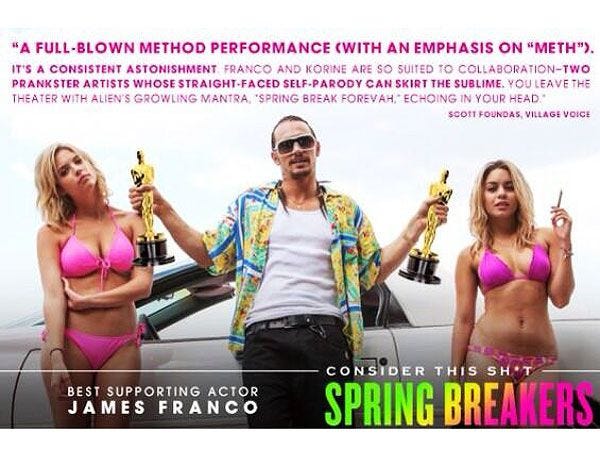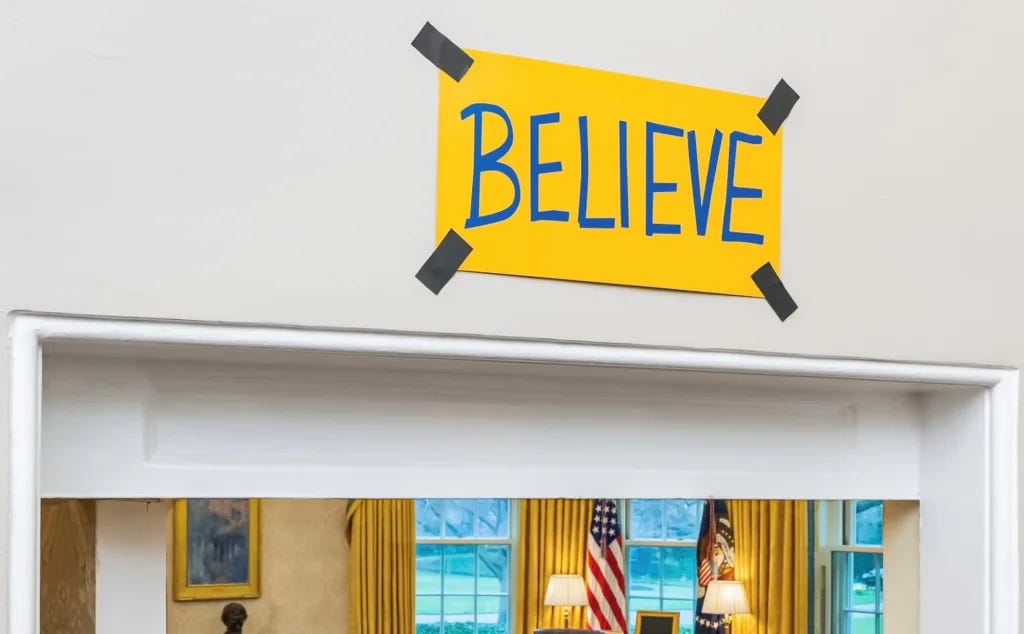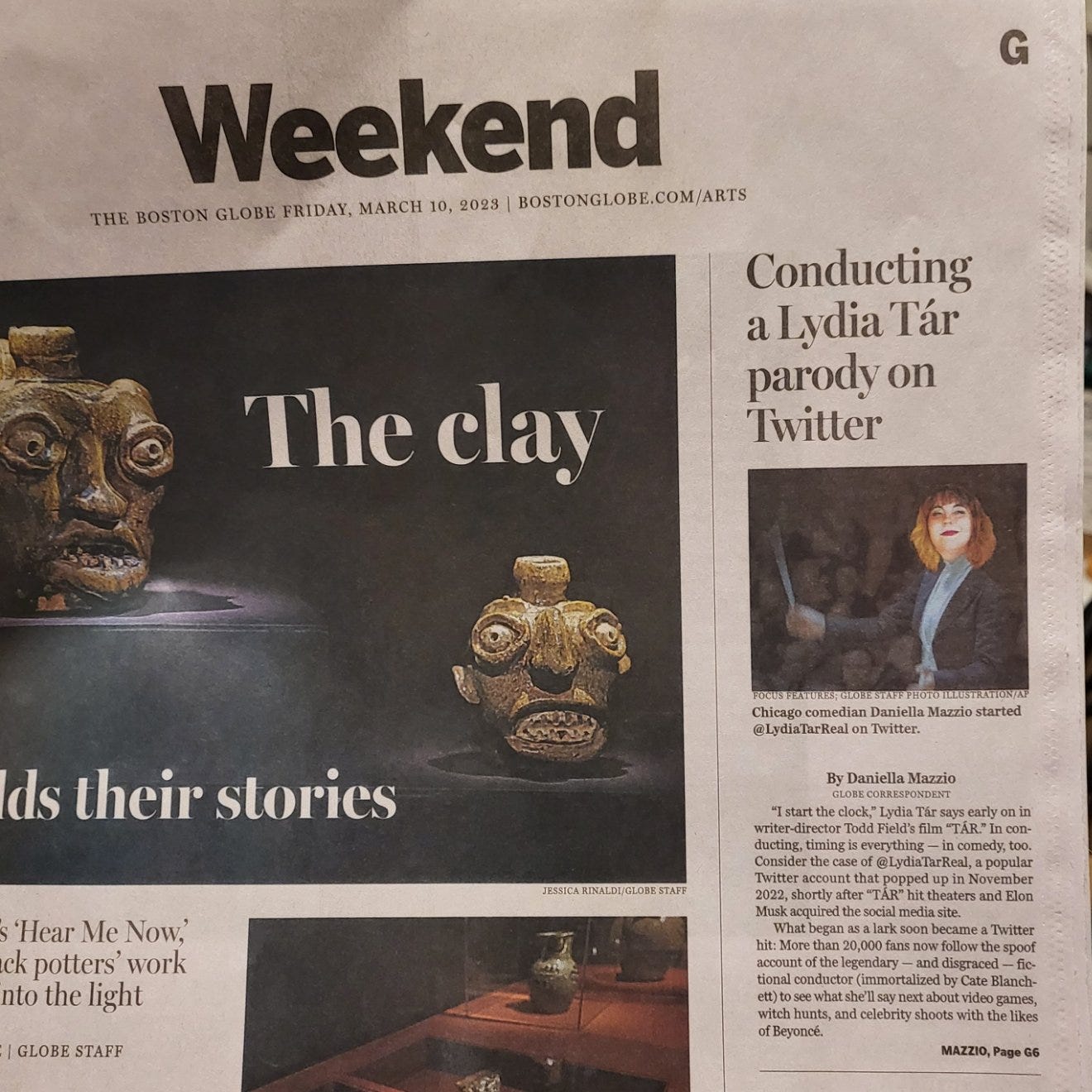Spring Breakers Forever
Spring Breakers 10 years later, Ted Lasso is at odds with itself, and my months-long foray as Lydia Tár's publicist.
It’s been a while since we’ve heard from each other, but do not worry — I’m back, I’m rebranding, and I’m just getting sTárted. And by all that nonsense, I mean I’ve been distracted the last several weeks with one of the silliest turns of events in my range of personal experiences: I went viral because of the movie Tár. No, really.
Context: One day in November when it seemed like Twitter might disappear any minute, I threw together the parody account that would be @LydiaTarReal. I could not have fathomed what would come of it, including over 20K followers in a little over three months, interactions with people like Knives Out director Rian Johnson, Gone Girl writer Gillian Flynn, and Yellowjackets star Melanie Lynskey, a fake website that would generate donations for the National Network of Abortion Funds (among other great organizations), interview requests for national culture coverage, and even a couple of bylines.
It has been an absurd period of time with an embarrassment of (very rare) kindness and generosity from the internet. I’ll ponder more on the whole experience another time, but here is a round-up of the media coverage and writing about the account.
Boston Globe | Conducting a Lydia Tar Parody Account on Twitter — by Daniella Mazzio
Slate | Everything That Happened at the Oscars — by Slate Staff, featuring contributions by Daniella Mazzio as Lydia Tár
The Daily Beast | Cate Blanchett’s #TarNation is Hollywood’s Hottest New Cult — by Jasmine Valentine
WBBM Newsradio | Chicagoan Conducts Faux 'Tár' Persona Online — by Steve Miller
Slate | A Very Real Conversation With, Uh, Lydia Tár — by Heather Schwedel
With that out of the way, onto some non-Tár-related writing. This past week, I revisited Spring Breakers upon its 10th anniversary (with the pleasure of introducing it for the first time to my partner Joe). Also, Ted Lasso was the earliest returning premiere in what is shaping up to be an incredible season of spring television. Unfortunately, I’m finding the show’s contradictions against itself both within its arc as well as in its marketing frustrating. Finally, I have a few recommendations for upcoming releases that might Blow Up — if enough people Show Up.
It’s Spring Break forever — and it will never end.
“That’s what I love about Spring Breakers, man. I get older, it stays the same age.”
— Me
It’s hard to think of a more bizarre, under-discussed recent film that has had more of a cultural footprint than Spring Breakers. If you asked anyone now, the percentage of people who have heard of the movie, much less those who have seen it, is likely a low statistic. And should you find someone who has familiarized themselves with the bikini-laden, James Franco-fronted 2013 film from transgressive, multidisciplinary filmmaker Harmony Korine, the chances of having any affection towards the film are… slim, if a Rotten Tomatoes audience score devastating enough to make Dwayne “The Rock” Johnson blush is any indication. Yet, the story of distribution and production company A24 (also in its 10th year) can’t be told without Spring Breakers, the third overall feature-film release from the company, A24’s first buzzy breakout, and the early indication of A24’s success as a marketer and Oscars campaigner.

But Spring Breakers’ timelessness (and audience alienation) isn’t so simply reduced to its placemaking for A24, the slew of neon-tinged vapid copycats that would follow, or even its prescience of James Franco as a sleaze who should stay far away from young women. To call Spring Breakers timeless may even feel like a misnomer given the Skrillex-helmed dubstep score and its cast of former Disney corporation millennial starlets.
Spring Breakers has been given throughout the past decade a bad rap for being a sleek movie with little to say, but there are so few films that have as ruthlessly taken aim at the specific underlying violence of — beneath a deceptive innocence — of privileged white womanhood. The four young women at the center have no apparent jobs, attend college without any interest in the higher education they have access to (within the movie’s first few minutes, two characters exchange crass notes about Spring Break plans as a lecture on Reconstruction plays in the background), and exoticize and participate in a criminal lifestyle without concern or threat of consequences. Their Spring Break is full of drugs, liquor, debauchery, and horned-up strangers. And then, their devil-may-care attitude is tested.
Faith, the first to return home, finds her breaking point when the strangers surrounding the women are no longer white frat guys. The second to break off is Cotty, who has no problem with gleefully inflicting violence until consequences put her on the receiving end. And the two that remain — Britt and Candy, the two blondes of the group, if that matters — find no limitations, feeling they’ve “found themselves” as they murderously tear through a host of Florida residents. Britt and Candy are the remaining tourists, juxtaposed against a criminal underworld of characters played by James Franco and Gucci Mane, characters who initially got into hustling for survival, not for fun. As Franco’s character Alien so poetically proclaims to his spring-breaking guests: “This is the fuckin' American dream.” ✿
How long do we “Believe” in Ted Lasso’s philosophy?

I’m not immune to the charms of the hit Apple TV+ show and Emmy’s juggernaut Ted Lasso, even if I felt a small dip in quality from season 1 to season 2. In fact, while I didn’t always feel last year’s season stuck the landing, I was impressed with some of the directions it took with respect to Ted’s eternally-cheery disposition as the show demonstrated the cracks that can form when a perpetual optimism machine is used to pave over more complex feelings of grief, resentment, and even rage. I was particularly impressed that the show chose this route considering its reputation as a champion for that very same brand of toxic positivity that may seem good-intentioned, but often forces us to view mental health as something we’re just not trying hard enough to fix. Coming from a non-profit background, I’m intimately familiar with the attitude that failure to feel joy or love in spite of adversity is a moral failing, ushering pain and trauma into unacknowledged corners that avoid facing root issues.
I was wondering where season 3 would fall with regard to the wholesome vibes that exist on the surface of the comedy-drama and that have always been in conflict with its stickier look at mental health, which is why I found it dismaying when the cast of the show did what I can only describe as thinly-veiled Spon-Con by appearing at the White House to deliver broad messages about mental health, not “being afraid to ask for help,” and to “take care of each other.”
Look, I believe in the power of community as much as anybody, but while the White House completely ignores addressing an Adderall shortage where the only solution from the DEA so far has been to make it more difficult for someone to receive a prescription in the first place, I’m not sure just asking for help cuts it. And that’s not to speak of the other public health failures and worsening state of health coverage that will only continue to exist as long as we convince one another that health is a personal problem that you can will away with enough positivity.
Writing this before catching up to episode 3, I’ll say that season 3 of Ted Lasso has started okay (I liked episode 2 much better than episode 1), but any of that depth that we saw a glimmer of last season seems to be in even shorter supply. For me, the biggest indication of the show’s philosophy will be in how the fracture of Nate and Ted’s relationship will be addressed. Will Ted face how his nature caused him to actively dismiss, ignore, and alienate Nate, as was called out in season 2? Or will the show throw up its hands, turning into a fable exclusively about Nate’s toxic masculinity, blaming him exclusively for his refusal to ask for help? ✿
Something to Spare:
Showing Up, Blowing Up, and Growing Up.
There are two movies coming out in early April that I am incredibly excited about and will likely continue singing the praises of all year.
Showing Up is writer/director Kelly Reichardt’s follow-up to First Cow and her fourth collaboration with actress Michelle Williams. I saw an early screening with Reichardt in person and felt seen. To some of my Ted Lasso thoughts, I think Showing Up is a really brilliant film about what it means to inhabit a community where no one actually acts in-community, what it means to crave connection while also desperate for boundaries, and what it means to want the noise to just stop when you are terrified of the quiet. Also, because of course, it is an A24 movie, and features three actors hot off of their Oscars tour (Williams and Judd Hirsch coming off of The Fabelmans and a lovely Hong Chau who was just nominated for The Whale). It might be too quirky for some, but Showing Up hit a personal chord that I’ll be thinking about for a while.
I’ve praised How to Blow Up a Pipeline in this blog before when I wrote about my favorites of 2022 (I ranked it at #6) after catching it at the Chicago International Film Festival. Without treading familiar ground, I’ll say that at the end of the day, besides being one of the most explicitly radical movies we've gotten about the climate crisis, it's just a really damn good, damn tight thriller.
Both Showing Up and How to Blow Up a Pipeline will hit theaters on April 7th, though I couldn’t think of two more tonally opposite films to potentially double feature. All the more reason to do so!
I also must give a shout to Creed III. I am a lifelong Rocky Cinematic Universe fan, and I thought Creed III was a good time and an even more exciting directing debut for Michael B. Jordan. What I loved most, though, was how confidently the movie refuses the standard sports/Rocky movie formula. Boxing is almost incidental to this story of two troubled kids who grew up in each other’s shadow, one way or another, and how they have to face the childhood that haunts them.
That’s all for now. I hope that you see lots of good movies, receive access to critical health care and essential social services, reject white feminism, and find a publicist as good as — or better than — Lydia Tár’s. May she rest in peace.







